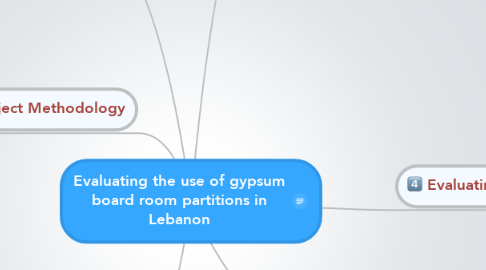
1. Introduction
1.1. Problem Description
1.2. Scope
1.2.1. How does it impact the construction industry?
1.2.2. Why is it LEED certified?
1.2.3. Impact of using green gypsum boards on environment
1.2.4. Is it more economical?
1.2.5. Importance of usage of this material in construction
1.2.6. Why substitute masonry units with Green Gypsum boards?
2. Project Methodology
2.1. Define Criteria
2.1.1. Used to later evaluate technologies
2.2. Research Materials
2.2.1. Sources Related from courses and experience aqcuired during our engineering studies :CIVE 320 (construction materials and technologies)
2.2.2. Trustworthy online sources
2.2.3. Database sources
2.3. Conduct Lab Experiment
2.3.1. Research the properties of domestic masonry blocks and gypsum boards - compare them to international standards
2.4. Interviews
2.4.1. Mr. Helmi El Khatib, Lab Manager in the Civil & Environmental Engineering at AUB
2.4.2. Dr. Mohamad Harajli, Professor in the Civil Engineering Department at AUB specialized in structures
2.4.3. Dr. Ghassan Chehab, Associate professor in the Civil& Environmental Engineering at AUB specialized in construction materials
3. Conclusion
3.1. Restate Findings with Recommandations
3.2. Our goal
3.3. Closing Statement
4. Technology Analysis
4.1. Technology Description
4.1.1. Traditional Masonry block
4.1.1.1. Physical & Thermal properties
4.1.1.1.1. Environmental Pollutant
4.1.1.1.2. Structural Dependency
4.1.1.1.3. Long installation process and procures
4.1.1.2. Cost
4.1.1.3. Availability
4.1.2. Gypsum boards
4.1.2.1. Physical & Thermal Prop.
4.1.2.1.1. Environmentally friendly
4.1.2.1.2. Sustainable
4.1.2.1.3. LEED certified
4.1.2.1.4. Noise isolator
4.1.2.1.5. Extended Durability
4.1.2.1.6. Fire-proofing
4.1.2.2. Cost Effectiveness
4.1.2.2.1. Fabrication process
4.1.2.2.2. Raw Materials
4.1.2.2.3. Money saving
4.1.2.3. Availability
4.1.2.3.1. May be less available due to the large scale use of masonry blocks in Lebanon
4.1.2.3.2. Decreasing maintenance needs
4.2. Lab Experiment
4.2.1. Apparatus setup
4.2.2. Procedure
4.2.3. Results
4.2.4. Analysis
5. Evaluating Technologies
5.1. Environmental Impact
5.1.1. Technology Production
5.1.2. Insulation/Thermal Benefits
5.1.3. Sound Isolation
5.1.4. Safety Considerations
5.2. Cost Effectiveness
5.2.1. Material and Labor Costs
5.2.2. Energy Costs
5.3. Ease of installation/Maintenance
5.4. Recommendation
5.4.1. Based upon the evaluations of each criteria
6. Various Notes
6.1. The lab will compare the domestic technologies and international standards found online. Doing so would make the lab experiment relevant to the domestic market.
6.1.1. Not all types of gypsum board and masonry blocks found in research are readily available in Lebanon
